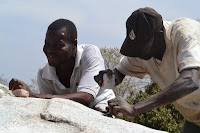 Our home is snuggled away in a quiet area of
Sandema and only a 5 minute walk from work. Surrounded by greenery, we live in
a pretty peaceful area with the only noise coming from the animals that roam
around our house and the funeral music (drumming and singing) which is
happening on a daily basis as it is the dry season.
Our home is snuggled away in a quiet area of
Sandema and only a 5 minute walk from work. Surrounded by greenery, we live in
a pretty peaceful area with the only noise coming from the animals that roam
around our house and the funeral music (drumming and singing) which is
happening on a daily basis as it is the dry season. Smack bang in the middle of the compound is the kitchen, a cherished place for us, especially as we’re often reminded that Sandema Team 1 had no kitchen initially. Although, there's no oven or microwave we’ve become quite resourceful with what’s available to us, even making cake and burritos! See more on our Food blog post which will be coming soon!
Our dining area is where we are at one with nature, especially in the evenings. During our candlelight dinners we have the amazing opportunity to do some star gazing in the evenings (I’ve personally never seen so many stars) and have fights with the creepy crawlies who also join us at the dinner table (see our Animal blog post which will also be coming soon!).

Oh and we do have our occasional water fights (that’s Tracy, our team leader, who is in the process of drenching me when I’m busy posing for this picture).

This is my room in the compound and one of the smaller ones but admittedly the best one. A piece of advice for the next volunteers, bring noise cancelling earphones. It’s rained a few nights whilst we’ve been here and it can get quite loud which can be quite annoying when you’re trying to get some sleep.
- Roya
















